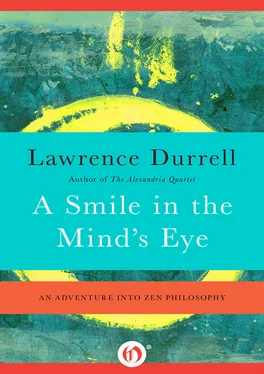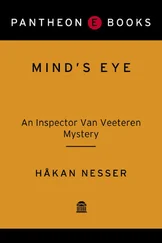Altogether it was a splendid evening, full of variety, and yet full of this directed concentration with which my friend sought to imprint my psyche. I could feel the fall-out getting into the wine — but not fast enough to prevent my drinking the statutory amount for a great evening. Afterwards he explained to me the dynamic of this little act — which is called just ‘sitting’ in Chinese. It is part of a health-giving mechanism which is within the powers of anyone and everyone. The aim is to modify conduct in a fruitful sense — if you have a friend who is harming himself by a certain line of conduct. By sitting close to him and concentrating on that conduct you can, so to speak, meditate him into another groove, another shift. Like switching points on a railway. It has nothing to do with professional medical healing where the doctor imposes his will and his treatment on the sick man; nor is it the imposition of one’s own will-power upon the patient. As he explained it, in the sitting technique one simply mentally steps into the character of your friend as one steps into a boat and starts trying to steer it. Obviously wind and current play their part. But by an act of friendly passivity one sometimes can prod them to modify fruitless conduct and reorient themselves … I labour this point because for a whole month and a half after the departure of Jolan my intake of red wine dropped back equably, without stress, to four or five glasses a day — against a customary four or five pints. But the influence wore off after a while. Yet it was like post-hypnotic suggestion, and I have since tried it myself on someone — just sitting, meditating, not saying anything — with distinct results in the right direction. I must say though that the wine gave a rosy glow to the text and its ideas of harmony and bounty; it made men and women natural allies, sexual partners in a cosmic technique. Indeed I saw some of the great Love-Masters to the Emperors were in fact women whose advice was sought. Great Love-Consultants, their names have come down through these texts full of the fragrance and ardour of a language which has never known prudishness or prurience in matters of love. We spoke of the breathing and yoga side of the matter (it was in this field that the wine was robbing me of control). But I had grasped the central notion as far as I could judge, in the Chinese context. I asked myself what differentiates the conduct of the acrobat from that of the yogi. The acrobat can perform feats of physical skill superior to the yogi’s postures however complicated, yet it leads him nowhere because the issue of his skill is not one of virtue involving a cosmic principle. He is unaware of the poetic lodestar the yogi captures — the magnetic field which he enters.
Jolan Chang gave a chortle. It was sad, but also in a strange way consoling, to find that during a whole historic period in China itself the notation of the Tao had been lost, the link between men and women had been broken. They had become vampires, the women; and the men lost and effeminate; the whole cultural and political scheme of things had lost its equilibrium. The states foundered in anarchy and dissolution. The germ in the wheat had gone bad. A dark age settled over the whole land. According to my friend Chinese history could offer more than one example of this sort of collapse of the historic consciousness together with the corresponding recovery which followed with the swing of the pendulum, for nothing lasts for ever. Would we live to see our own age recover its wits? I wondered. Everything in nature hangs by a hair …‘Embark on the Tao and you won’t have a moment’s peace, because it demands unremitting application and comprehension and balance.’ (That is what Lao Tsu was saying.) You are like a tightrope-walker high above a city; yet with practice you can one day do the walk blindfold, without vertigo. Against reason I have always believed so. It was encouraging that Chang also supported this interpretation of the poem.
Before we turned in that evening for the usual shortened sleep I witnessed an amusing outbreak of Chinese humour, which came over my friend in a wave at the sight of an ashtray. By some singular coincidence the gypsies and traders had been bringing all sorts of esoteric trinkets into the village for the Saturday market. Esoteric in the sense that there were flower vases of glass marked ‘Birmingham’, marvellously life-like Indian roses made of silk, and so on. Among all this stuff I happened upon a couple of little bamboo ashtrays, pleasant of shape and with a colour-wash design on them depicting a bush, a river, the figure of a girl holding a fishing rod. The style was very debased but the idiom was quite inescapably Chinese. In a search for matches by the kitchen sink Chang hit upon one of these trinkets. He uttered an exclamation of curiosity and picked it up to examine it. He turned it over. On the back it had a legend in English which read ‘Made in Taiwan’. Something came over him as he read the words and he turned to me, helpless with laughter, pointing at the phrase with his finger, speechless with mirth. In a sort of way I could follow the contours of this cosmic joke — if one thought of the immensity and complexity and age of China and the triviality of contemporary power politics in the hands of American cowboys, or evangelical tycoons with Las Vegas souls … Yes, it merited the laughter. It was so infectious, his laugh, that I was forced to join in, and together we doubled up laughing until our sides ached and I implored him to stop.
‘Taiwan,’ he gasped helplessly.
‘Taiwan,’ I echoed, just as helpless. There was no need for a further gloze on the matter, though what the gardener would have made of our behaviour I have no idea. For some time afterwards whenever Jolan caught sight of this little saucer with its debased and disinherited scribble he gave an involuntary chuckle.
He had brought a certain amount of ancillary documentation with him of the Kinseyfied kind, and while I have nothing against the statistical approach I know how untrustworthy it can be when used as a basis for analysis, and also how few questionnaires are ever really truthfully filled in. Chang did not agree about this. He had seen some good results in the quantitative field. Yes, but were we harking back to a lost innocence or forward to a shift in principle in the West which might modify, not merely conduct, the inward dispositions of the psyche — given the new permissive (so-called) changes of sexual behaviour? Chang said, ‘Look, I am not selling anything. I offer you here a sheaf of texts which adds up to a fairly coherent system devoted to health and psychic balance.’
We spoke, I remember, a good deal about Henry Miller and his ailments which interested Chang very much, for he admired his work and had grasped the central implication in it which so many people still miss. Miller himself has said it somewhere in an interview: ‘My books are not about sex, they are about self-liberation.’ Chang was delighted to hear that he was in his eighties and convinced that with a little care he might top the hundred — after which, apparently, things got very much easier. He said he would like to give him some free advice strictly as a gerontologist, and to this end I dug out a typewriter and started to take dictation — which resulted in a long and detailed letter about how to conserve his energies and faculties. There were some Chinese herbs he mentioned like the Gin Seng root — but Miller was already taking these. The marvellous thing was the old writer’s joyful optimism in spite of a wonky leg with a plastic artery which didn’t really do the work of the real one which they had removed; and then one eye was also giving him trouble. Chang assured me that all this was quite remediable if his advice were followed, so we packed off a long letter to Miller with all speed.
Читать дальше











